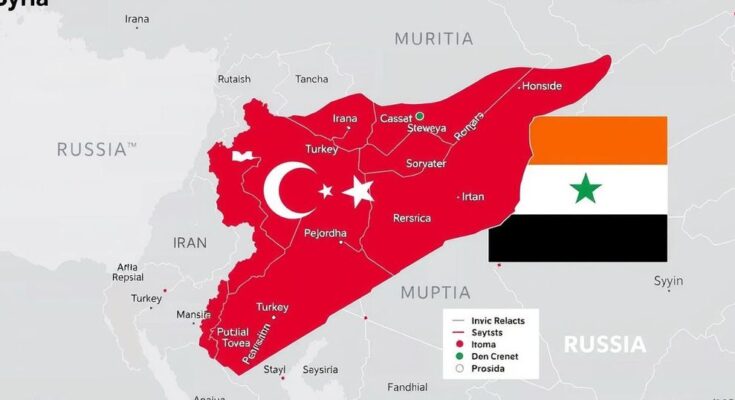The rebellion leading to the ousting of Bashar al-Assad has created a power vacuum in Syria, dominated by groups like Hayat Tahrir al-Sham (HTS). Turkey has assumed a significant role, pushing against Kurdish influence, while Iran and Russia face setbacks in their strategic positions. Without effective governance from these factions, Syria risks ongoing instability and potential external intervention.
The recent ousting of Bashar al-Assad has dramatically altered the geopolitical landscape in Syria, leading to a fragmented control among various armed factions with significant backing from major international players. The most powerful group, Hayat Tahrir al-Sham (HTS), has capitalized on this upheaval to extend its territory across key regions, including the capital, Damascus. Initially formed as an al-Qaeda affiliate, HTS has shifted its focus towards local governance and the removal of Iranian influence, positioning itself as a significant actor in the ongoing conflict.
Turkey has emerged as a pivotal force, facilitating operations against Assad’s regime, while simultaneously aiming to diminish Kurdish influence in northern Syria. Iran, on the other hand, faces a strategic setback, losing its access to the Mediterranean and diminishing its support for Hezbollah, a crucial component of its regional policy. Russia, despite its historical support for Assad, now confronts an uncertain future in Syria, complicating its military and diplomatic objectives.
International efforts to establish peace, such as the 2017 Kazakhstan negotiations led by Turkey, Iran, and Russia, have proven ineffective due to the disunity among factions and ongoing territorial divisions. The Kurdish-led Syrian Defense Forces (SDF) and Turkish-backed Syrian National Army remain key players, with their future actions likely to define the stability of the new Syrian state. Without a cohesive transitional government that includes all factions, Syria risks further fragmentation, inviting intervention from external powers and hindering any genuine reconstruction efforts.
The Syrian civil war has created a complex and layered conflict, embroiling multiple foreign powers with competing interests. Bashar al-Assad’s long-standing regime faced significant opposition, leading to his eventual ousting amid a power shift favoring various rebel factions. The fragmented control of Syria and the role of international players, like Turkey, Iran, and Russia, have rendered previous attempts at a diplomatic resolution largely ineffective. The political future of Syria now hinges on the ability of its factions to unify and instate a stable government that reflects a broad coalition of interests.
The implications of Assad’s ousting underscore a critical turning point for Syria, fundamentally reshaping the roles of regional and global powers. Turkey is positioned to play a dominant role, while Iran and Russia’s influence appears diminished. The emergence of groups like HTS and the SDF illustrates the continuing fragmentation of Syrian control. For a sustainable peace to be achieved, Syrians must forge a cooperative and inclusive governance structure, free from external domination, that addresses the diverse needs and aspirations of all factions involved.
Original Source: theconversation.com




